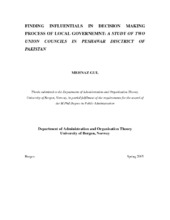Finding influentials in decision making process of local government: A study of two union councils in Peshawar district of Pakistan
Master thesis
Permanent lenke
https://hdl.handle.net/1956/1185Utgivelsesdato
2005Metadata
Vis full innførselSamlinger
- Department of Government [455]
Sammendrag
My study is about elites influence in the decision making process of local government ofPakistan. In 2000 Pakistan introduced a new local government system under devolutionof power plan, which promising to devolve the power to grass roots. The new system wasimplemented in 2001 after holding of non party based elections. Though people ingeneral seem to be happy with the system, the critics have charged the system for notfulfilling the promise, rather having empowered the local economic and political elitesmore than before.This study attempted to find who, with what background, have influence in the decisionmaking process of Local Government in Pakistan. The study is operationalized on thetheoretical concepts of elite school of thought, applying its positional and reputationalmethods to identify elites. It aimed at finding the positions, gender, socio-economic,cultural, political and expertise of the Councillors. Two Union Councils, University townand Karimpura of Peshawar District, were selected as sample of the study.The data were gathered about 31 councillors through a comprehensive questionnaireembedding interview, case study and group discussion while SPSS was used for analysesand interpretation. The study analyzed 21 variables, among which 7 had direct andpositive relationship and 7 had none in both Union Councils, while the rest 7 aresignificant in only one Union Council. Overall position, gender, education, income,leadership roles and political factors to varying extent, seem important attributes of theCouncilors assessed highly influential by their peer Councilors. However, both UnionCouncils, show different results about seven variables, which could be due to theirdemographic, socio-economic and cultural differences, and Councillors functions as wellas smaller number of respondents in Karimpura Union Council than the University TownUnion Council.However, the findings of the study reveal elites influence in decision making of UnionCouncils, but do not indicate their mal handling of the power; rather most of them havecompleted successfully many development works for the uplift of their community.
Utgiver
The University of BergenOpphavsrett
The authorCopyright the author. All rights reserved
